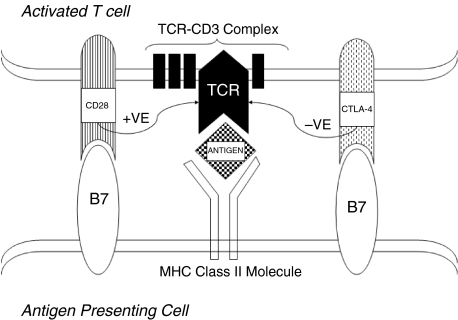Fig. 3.
The stimulatory pathway of CD28 and the antagonist effect of CTLA-4 on Th cell activation. T cell activation occurs via a two stage process. Stage 1 involves generation of a signal via the interaction of a presented antigen with the TCR-CD3 complex. Stage 2 of T cell activation involves a costimulatory signal from CD28 interaction with B7. Regulation of this second stage of T cell activation is provided by a down regulation of T cell activation by CTLA-4. Due to the negative control function of CTLA-4, functional mutations in this gene could increase susceptibility to autoimmune thyroid disease.

